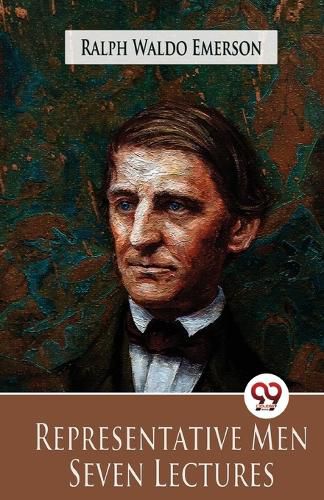Readings Newsletter
Become a Readings Member to make your shopping experience even easier.
Sign in or sign up for free!
You’re not far away from qualifying for FREE standard shipping within Australia
You’ve qualified for FREE standard shipping within Australia
The cart is loading…






This title is printed to order. This book may have been self-published. If so, we cannot guarantee the quality of the content. In the main most books will have gone through the editing process however some may not. We therefore suggest that you be aware of this before ordering this book. If in doubt check either the author or publisher’s details as we are unable to accept any returns unless they are faulty. Please contact us if you have any questions.
"Representative Men" is a collection of seven lectures given by Ralph Waldo Emerson in the mid-19th century. The lectures explore the lives and ideas of several influential figures from history, including Plato, Shakespeare, Montaigne, Napoleon, and Goethe. Emerson uses these figures as examples of what he calls "representative men," individuals who embody the ideals and principles of their time and culture. He argues that by studying the lives and works of these individuals, we can gain insight into the broader patterns of human history and society. Each lecture focuses on a different figure and their unique contributions to philosophy, literature, politics, or culture. For example, the lecture on Shakespeare examines his role in shaping the English language and his insights into human nature, while the lecture on Napoleon discusses his military and political achievements. Throughout the lectures, Emerson emphasizes the importance of individualism, creativity, and self-reliance. He argues that these values are essential for anyone seeking to make a meaningful contribution to society and that they can be cultivated by studying the lives of representative men and women from history. Overall, "Representative Men" is a celebration of human potential and a call to action for individuals to pursue their own unique paths in life.
$9.00 standard shipping within Australia
FREE standard shipping within Australia for orders over $100.00
Express & International shipping calculated at checkout
This title is printed to order. This book may have been self-published. If so, we cannot guarantee the quality of the content. In the main most books will have gone through the editing process however some may not. We therefore suggest that you be aware of this before ordering this book. If in doubt check either the author or publisher’s details as we are unable to accept any returns unless they are faulty. Please contact us if you have any questions.
"Representative Men" is a collection of seven lectures given by Ralph Waldo Emerson in the mid-19th century. The lectures explore the lives and ideas of several influential figures from history, including Plato, Shakespeare, Montaigne, Napoleon, and Goethe. Emerson uses these figures as examples of what he calls "representative men," individuals who embody the ideals and principles of their time and culture. He argues that by studying the lives and works of these individuals, we can gain insight into the broader patterns of human history and society. Each lecture focuses on a different figure and their unique contributions to philosophy, literature, politics, or culture. For example, the lecture on Shakespeare examines his role in shaping the English language and his insights into human nature, while the lecture on Napoleon discusses his military and political achievements. Throughout the lectures, Emerson emphasizes the importance of individualism, creativity, and self-reliance. He argues that these values are essential for anyone seeking to make a meaningful contribution to society and that they can be cultivated by studying the lives of representative men and women from history. Overall, "Representative Men" is a celebration of human potential and a call to action for individuals to pursue their own unique paths in life.